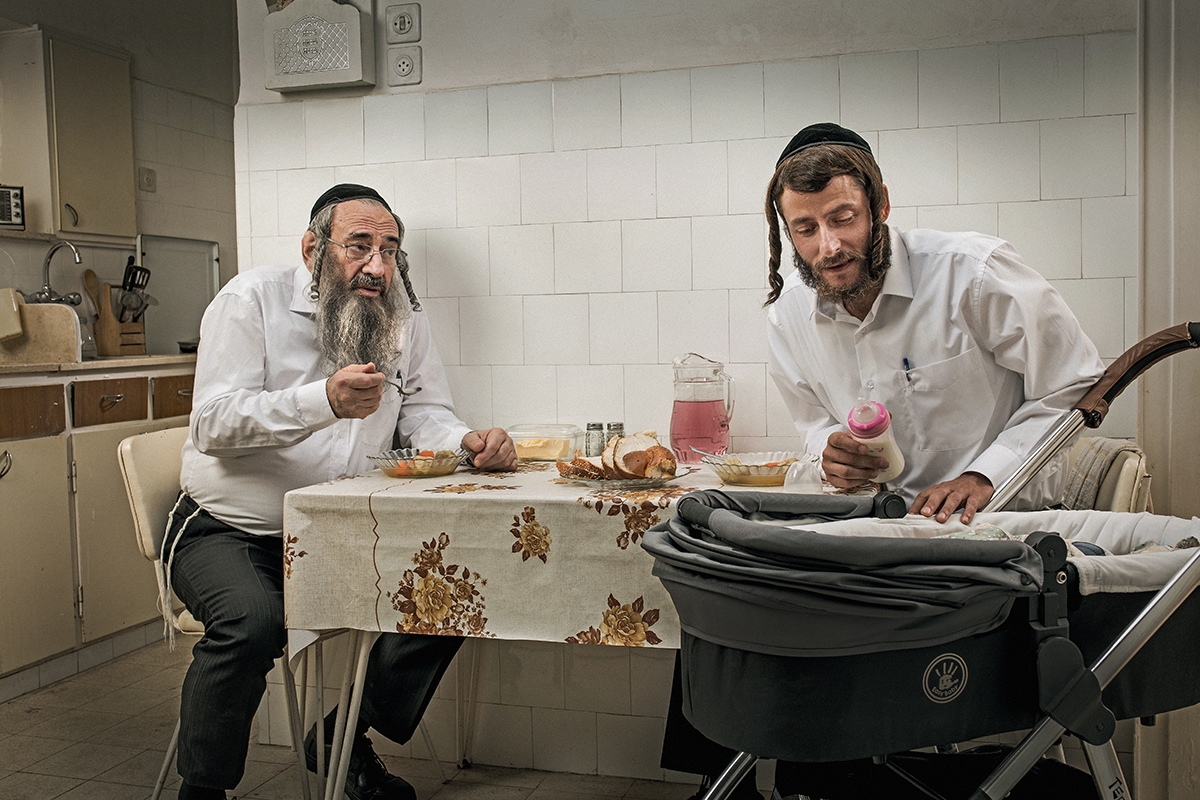Yehonatan Indursky gave us one of the most sensitive portrayals of Haredi, or ultra-Orthodox, life on TV, through his international hit show “Shtisel” which he co-wrote with fellow former Orthodox creator Ori Elon. Indursky, who grew up the youngest of five in Jerusalem’s Givat Shaul neighborhood in a Litvak-Haredi family, and who studied in a yeshiva in Bnei Brak before leaving it and the religion he grew up in at age 19, wrote most of his work as a secular Jew. And yet, last week, he opened up about identifying as Haredi once again.
“For many years, I fought the fact that I was Haredi. I worked hard at being secular,” he told the Israeli publication Ynet in an interview about his life and his work. “Until suddenly I stopped.”
That kind of identity switch, from Haredi to secular and then back to Haredi, is fairly rare — we hear mostly stories of one lateral move away or towards a more religious observance. Yet some would argue that through his work, Indursky never strayed too far from the Haredi world of his youth.
In “Shtisel,” along with his show “Autonomies” and his debut play “Babchik,” which tells the story of a Haredi restaurant owner trying to combat a deadly family curse, he always found a way to still “live” in the Haredi Jewish world. More than that, he created a bridge between the Haredi lifestyle and that of the secular world — telling stories of deeply feeling and intensely observant people that enchanted secular and religious audiences alike, and that helped us find the humanity and commonality in us all.
Indursky attributes a lot of things to the reason why he is once again wearing a black hat and growing out his peyos, or sidecurls. One of them is his encounter with his wife, Eva, an observant Jewish immigrant from France. “I always knew that in the end, I’d fall in love with a religious person,” he told Ynet. The thought of having kids also contributed to the shift — he wants to raise his children with the kind of religious education and values he grew up with. “My father was Haredi, my grandfather was Haredi, and my son will also be Haredi, if he wants to be.”
He also credits his parents with keeping him comfortable and close to religion, and especially his mother’s cancer diagnosis a few years ago (she is currently in remission). When he was almost 19, he decided to leave his yeshiva, to which he attended since age 16 (he later made a documentary about it titled “Ponevezh Time”) and planned to go to a shelter for formerly Haredi youth while leaving a letter behind for his parents announcing that he was becoming secular.
Yet, his parents found him at the shelter and asked him to come back to live with them in Jerusalem. They told him they’d love him and accept him no matter what — they just wanted him near. He later discovered that his mom would fast once a week in hopes that he would return to the fold.
Indursky always felt like an outsider, ill at ease in the secular world — but in his Haredi garb, which he only started fully donning a few months ago, he finally feels like himself again.
Indursky now attends services at a local synagogue of the Gur Hasidic sect and lives in the heart of Tel Aviv, a city that is also the epicenter of the current protests and activism against Israel’s judicial reform led by religious right-wing Israeli politicians. The fight right now feels like it’s between Jewish Orthodoxy and liberalism, between the religious world and the secular world, between extreme ideals and human rights. It’s a world that Indursky sort of imagined in “Autonomies,” about two separate Israeli “states,” one Haredi autonomy and one secular country, separated by checkpoints and borders. But unlike in “Autonomies,” Indursky believes the current state of Israel is too delicate for a civil war — or as it’s called in Hebrew, a war of brothers.
Indursky says he sometimes felt pre-judged by his secular neighbors, but that he is against the judicial reform — which he calls an egregious offense against the status quo Israel is built on — and is pro-women’s and LGBTQ+ rights. He said he hopes one day that Haredi leaders will understand how important it is to accept homosexuality. And while he regrets not serving in the IDF, he says he is against making Haredi people serve in the army.
In the current political climate in Israel, religious voices like Indursky’s, which are looking to bridge the ever growing divide, feel like a balm. Aside from his recent critically acclaimed play, Indursky has been working on a “Shtisel” sequel, “Kugel,” due to premiere in the upcoming Jewish year on Yes network in Israel. His work of helping secular people find kinship with Haredi people still continues, fighting against an increasingly polarized world.








